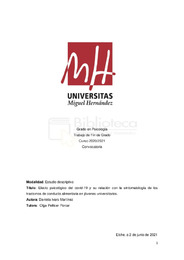Abstract:
A raíz del COVID-19, los TCA han cobrado importancia entre los investigadores. Se ha tratado de identificar los factores de riesgo involucrados en esta problemática, principalmente, en jóvenes. El objetivo de esta investigación fue determinar la frecuencia de sintomatología de los TCA durante la pandemia en población universitaria española. La muestra fue N= 212 participantes, (68,9% de mujeres; 31,1% hombres) con edades de 18-35 años. La ‘Sintomatología TCA’ se midió con el EAT-26 y el resto de las variables predictoras (Estrés, Apoyo social, Insatisfacción con la imagen corporal y Uso de Redes Sociales) con sus instrumentos correspondientes. Resultados. La Insatisfacción con la imagen corporal y el estrés presentan una alta correlación con la sintomatología TCA. El análisis de regresión múltiple explicó un 45.9% de la varianza total. En orden de importancia están: Insatisfacción con la imagen corporal (β = 0,579), Estrés (β = 0,189), Apoyo social (β = 0,129) y subescalas de uso de RRSS: Obsesión (β = 0,128), Uso excesivo (β = –0,086) y Falta de control (β = –0,024). Conclusión. Se ha observado la relevancia de todas las variables seleccionadas, destacando, la insatisfacción de la imagen personal y el estrés en relación con la sintomatología de los TCA.
In the wake of COVID-19, the EDs have gained importance among researchers. It has been tried to identify the risk factors involved in this problem, principally, in youths. The aim of this work was determine the frequency of symptoms of eating disorders during the pandemic in spanish university students. The sample was N= 212 participants, (68,9% women; 31,1% men) with ages of 18-35. The EAT- 26 instrument for ‘Symptoms of EDs’ screening and the rest of the predictor variables (Stress, Social Support, Body Dissatisfaction and uso of Social Media) with their related instruments. Result. The body dissatisfaction and stress present a high correlation with the symptoms of EDs. The multiple regression análisis explained a 45.9% of total variance. In order of de importance they’re: Body Dissatisfaction (β = 0,579), Stress (β = 0,189), Social Support (β = 0,129) and subescale of social media uses: Obsession (β = 0,128), Excessive Use (β = –0,086) and Lack of Control (β = –0,024). Conclution. It has been observed the relevance of all selected variables, underline, the body dissatisfaction and the stress in connection with the symptoms of EDs.
|
.png)

